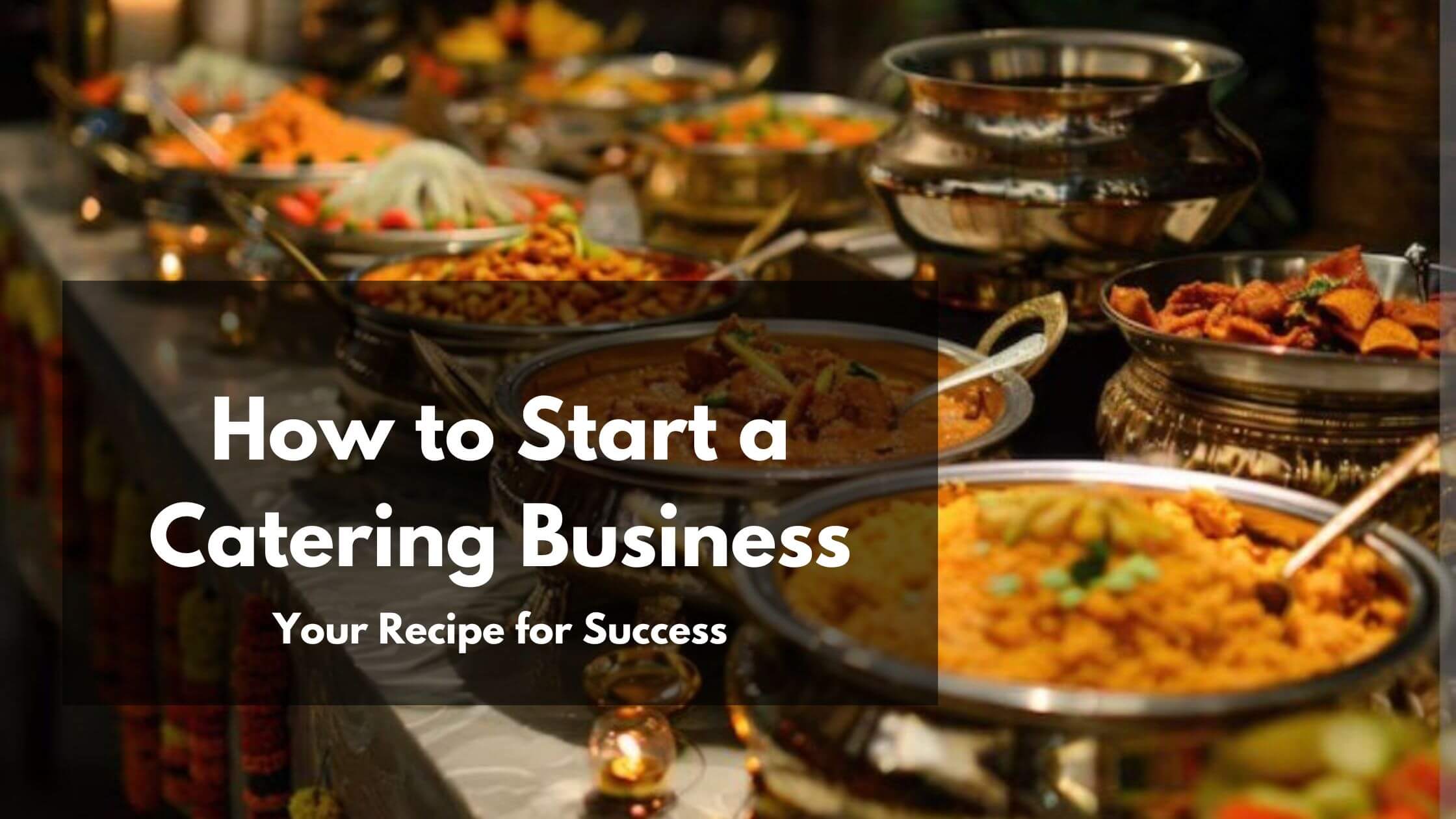Do you dream of turning your culinary passion into a thriving business? Starting a catering business can be an exciting way to combine creativity with entrepreneurship, serving up memorable experiences for every occasion. Whether you’re crafting seasonal menus, catering weddings, or managing corporate lunches, the opportunities in the catering industry are as vast as your imagination.
This beginner-friendly guide will walk you through every step of building a successful catering business, from crafting a standout menu to marketing your services locally and online. You’ll learn how to navigate legal requirements, manage food safety, and create a brand that clients can trust. Ready to turn your love for food into a profitable venture? Let’s get started!
How To Start a Catering Business Today: A Beginner’s Roadmap to Success
Starting a catering business can be an exciting way to turn your love for food into a profitable venture. From crafting a standout menu to managing logistics and marketing, this beginner’s guide walks you through every step to launch and grow your catering business successfully. Get ready to serve up success!
Step 1: Understanding the Catering Industry
The catering industry is a dynamic and rewarding field that blends creativity with service. At its core, catering involves providing food and beverages for various events, such as weddings, corporate meetings, parties, and festivals.

One of the key appeals of a catering business is its versatility. You can specialize in different types of catering, including:
- Corporate Catering: Focused on office events, meetings, and conferences.
- Wedding Catering: Tailored menus and services for the bride, groom, and guests.
- Buffet Catering: Flexible options for large gatherings with diverse food choices.
- Drop-off Catering: Providing prepared meals without on-site service.
The industry also demands an understanding of emerging trends, such as offering vegetarian, vegan, or gluten-free options and incorporating sustainable practices like zero-waste cooking and locally sourced ingredients. By embracing these trends, you can attract modern clients and stand out from competitors.
Step 2: Preparing to Launch
Starting a catering business begins with detailed planning, preparation, and the right name. Here’s how to get started:
Research and Planning
Identify your target audience and their specific needs. For instance, corporate clients may prioritize punctuality and professionalism, while wedding clients look for personalized touches. Analyze your local competitors to see what works and identify market gaps you can fill with your unique offerings.
Legal and Financial Setup
Secure the necessary licenses and permits, such as a food service license and liability insurance, to protect your business. Plan your budget carefully, considering costs for kitchen equipment, staffing, marketing, and ingredients. Using cost-effective strategies like sourcing seasonal ingredients can help keep expenses manageable.
Menu Development
Your menu is your primary selling point. Develop a diverse menu that caters to various tastes and dietary requirements. Offering signature dishes or customizable options can set you apart. A well-planned menu also ensures operational efficiency, as you’ll need to manage inventory and prep time effectively.
Step 3: Building Your Business
A strong foundation is essential for a successful catering business.
Branding
Your brand is how clients perceive your business. Choose a memorable name that reflects your style and offerings. Invest in a professional logo and cohesive branding across all platforms, from your website to your catering packaging. This creates a lasting impression and builds trust with potential clients.
Operational Setup
Set up a commercial-grade kitchen that complies with health and safety regulations. If you’re starting small, consider renting a commissary kitchen to save costs. Invest in reliable equipment, such as food warmers, delivery vans, and serving utensils, to ensure smooth operations.

Building a Team
Hire skilled staff who share your vision for quality and service. From chefs to servers, your team plays a crucial role in delivering exceptional experiences for your clients.
Step 4: Marketing Your Catering Business
Marketing is the key to attracting and retaining clients.
Local SEO Strategies
Optimize your business for local searches. Claim your Google My Business profile, add photos of your dishes and events, and encourage reviews from satisfied clients. Use targeted keywords like “event catering in [city]” or “wedding caterers near me” to improve your visibility online.
Digital Marketing
Leverage social media platforms to showcase your work. Post high-quality photos of your food, share behind-the-scenes content, and engage with followers through polls or Q&A sessions. Platforms like Instagram and Pinterest are particularly effective for visually appealing industries like catering.
Offline Marketing
Don’t underestimate the power of word-of-mouth referrals. Partner with event planners, venues, and vendors to gain access to their client base. Attending community events or offering free samples can also help you build your reputation locally.
Promotions and Offers
Run introductory discounts or package deals to attract new clients. For example, offering a discount for first-time bookings can encourage hesitant customers to try your services.
Step 5: Operational Success Tips

Running a catering business smoothly requires mastering the balance between efficiency and quality. Every event, big or small, depends on your ability to deliver a seamless experience, and here’s how to achieve that:
Streamlining Bookings:
Invest in user-friendly booking systems that allow clients to easily check availability, browse menu options, and make reservations. Many platforms also integrate payment gateways and event scheduling, saving you time and reducing errors.
Managing Logistics:
Ensure your food preparation and delivery processes are well-organized. For example, pack meals in insulated containers to maintain freshness and schedule deliveries with buffer times to account for traffic or unexpected delays. Your setup should also include contingency plans for last-minute changes or cancellations.
Client Relationships:
Effective communication is crucial. Meet with clients to understand their expectations and offer personalized suggestions. For recurring clients, maintain a record of their preferences to provide a consistent experience that feels tailored to them. By going above and beyond in customer service, you’ll foster loyalty and receive positive referrals.
Step 6: Scaling Your Business
As your catering business gains traction, scaling up allows you to expand your services and increase revenue. Here are practical steps to grow sustainably:
Diversify Your Offerings:
Introduce new services or menus to cater to wider audiences. For instance, you can explore niche catering options like gourmet meal boxes, holiday-themed menus, or food-and-drink pairings. Specialization in a trending cuisine or unique dining experience can also give you a competitive edge.
Expand Your Network:
Partner with wedding planners, corporate event organizers, and venue owners to secure a steady stream of referrals. Attend trade shows and community events to build relationships with potential clients and collaborators.
Leverage Technology:
Automation tools can simplify processes like order management, billing, and communication. Customer Relationship Management (CRM) software helps you track leads, manage client data, and send targeted marketing emails, which are vital for scaling efficiently.
Hiring and Training Staff:
Scaling requires a larger team that aligns with your business’s vision. Invest in comprehensive training programs to ensure every team member delivers consistent quality. Well-trained staff can take on more responsibilities, allowing you to focus on strategic decisions.
Step 7: Common Challenges and How to Overcome Them
Every business faces obstacles, but anticipating and preparing for challenges can make a significant difference in your catering business’s success:
Managing Costs:
Fluctuating ingredient prices and food waste can eat into your profits. To control costs, work with trusted suppliers to negotiate discounts for bulk purchases. Use inventory management systems to track stock levels and avoid over-purchasing. Creative menu planning, such as using seasonal ingredients, can also keep costs low.
Handling High-Pressure Events:
Events can be unpredictable, from last-minute menu changes to equipment failures. Build a reliable team that can adapt to challenges quickly and invest in backup equipment. Additionally, have a clear communication plan for your staff to ensure everyone is on the same page during events.
Staying Ahead of Competition:
The catering industry is competitive, but a strong, unique selling point (USP) can set you apart. Whether it’s exceptional service, innovative presentation, or sustainable practices, emphasize what makes your business unique. Regularly gather client feedback to refine your services and stay responsive to market trends.
Step into the World of Catering
Starting a catering business is your chance to turn your love for food into a fulfilling and profitable venture. With careful planning, a standout menu, and a focus on exceptional service, you can create unforgettable experiences for your clients.
By understanding the industry, optimizing your operations, and leveraging marketing strategies, you’ll position your business for success. As you grow, explore new opportunities, adapt to trends, and always prioritize customer satisfaction.
Take the first step today, and let your passion for food pave the way to a thriving catering business!







